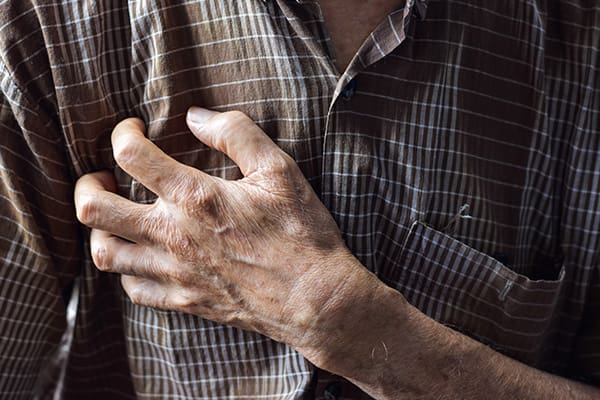
Immunotherapies have become increasingly popular in recent years. These cutting-edge drugs use the immune system to fight cancer. And they work better than chemo for some mesothelioma patients. But like all cancer treatments, immunotherapy drugs can cause side effects.
In general, immunotherapy side effects are common but manageable. In rare cases, they may become serious or life-threatening. The worst side effects of popular immunotherapy drugs include:
- Heart issues
- Lung damage and breathing problems
- Major digestive system complications
- New-onset diabetes
While these side effects may sound alarming, most patients will not experience them. In fact, research shows most of these reactions occur in less than 1% of patients. They tend to be more frequent in those who take multiple immunotherapy drugs.
1: Heart Damage
Immunotherapy drugs like ICIs let the immune system attack and kill cancer cells. But in rare cases, immune cells may attack healthy tissues. This can cause reactions that affect the heart and other organs. Some patients have experienced heart failure linked to ICIs. Others have had abnormal heartbeats and changes to the shape and function of their hearts.
According to research, cardiac side effects occur in less than 1% of patients who take ICIs. But they can be life-threatening if left untreated. People taking ICIs should ask their doctors which early signs to look for. Catching cardiac side effects early may help reduce the seriousness of any lasting effects.
2: Lung Damage and Breathing Problems
Some patients have lung and breathing reactions while taking ICIs. These uncommon side effects can happen when immune cells mistakenly attack lung tissues. The following lung problems have been reported by some patients taking ICIs:
- Abnormal buildup of cells or fluid in the lung
- Inflammation of the entire lung or parts of it
- Pneumonia (inflammation and fluid in the lungs)
- Reduced lung function
In studies, most lung problems occurred in less than 5% of patients taking a single ICI drug. For ICI combinations, this rate is closer to 10%.
The Opdivo+Yervoy clinical trial tracked these side effects in lung cancer patients. About 9% of study patients reported lung inflammation. Standard steroid treatment resolved the condition for most patients. But a few cases were fatal.
Patients should report any suspected lung problems to their doctors as soon as possible. Early detection may help healthcare providers manage the reaction more successfully.
3: Digestive System Complications
Immunotherapy drugs can cause gastrointestinal side effects. These reactions may happen because of inflammation or immune cell attacks in the intestines. Digestive complications are often mild to moderate, but some may become serious.
Digestive system side effects of ICIs include:
- Abdominal pain
- Diarrhea
- Nausea
- Vomiting
Diarrhea is among the most common reactions to ICI drugs. In some studies, up to 50% of patients experienced immunotherapy-related diarrhea.
In the Opdivo+Yervoy clinical trial, about 26% of lung cancer patients had diarrhea due to colitis. Colitis is inflammation of the large intestine. Most cases were not severe.
Patients should promptly report any signs of gastrointestinal distress to their healthcare teams. This may help doctors manage reactions more effectively.
4: New-Onset Type 1 Diabetes
Some immunotherapy drugs may cause patients to develop type 1 diabetes. Researchers have linked this side effect to ICIs. Experts estimate checkpoint inhibitors trigger type 1 diabetes in 0.2% – 1% of patients who take them. This side effect may occur more frequently with drugs that target the PD-1 immune checkpoint. Common PD-1 targeting drugs include Keytruda® (pembrolizumab) and Opdivo® (nivolumab).
Researchers tracked this side effect in the Opdivo clinical trial. Less than 1% of trial patients developed drug-induced diabetes. The condition was temporary for about 30% of people who experienced it. In most patients, the side effect was not serious enough to stop taking Opdivo.
Since this reaction is quite rare, doctors are not sure exactly why it happens. But certain factors may increase a person’s risk, including:
- Being younger
- Having type 2 diabetes
- Taking more than one checkpoint inhibitor drug
Symptoms of ICI-related diabetes include high blood sugar and frequent urination. Oncologists can explain the signs and risk factors for ICI-related diabetes. This can help patients understand what to watch for. If symptoms of this side effect arise, patients should report them to their doctors immediately. This can help ensure timely and appropriate treatment.
What Does This Mean for Patients Taking Immunotherapy Drugs?
Some of these reactions sound scary. But patients should keep in mind that the worst immunotherapy side effects are quite rare. When caught early and treated appropriately, even serious reactions are usually manageable. And in general, immunotherapy side effects are milder than those of chemotherapy.
Patients should discuss these reactions with their doctors. Caregivers should also learn the warning signs. This can help ensure any negative reactions are treated promptly.
Even with the slim chance of these side effects, immunotherapies help millions of people. And for eligible patients, these drugs are often a welcome alternative to chemotherapy.



